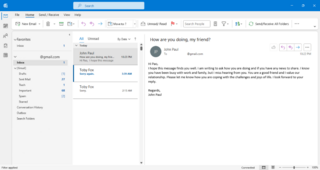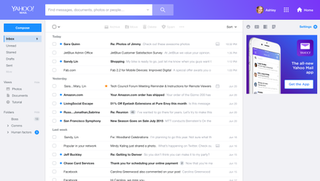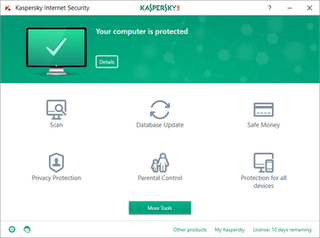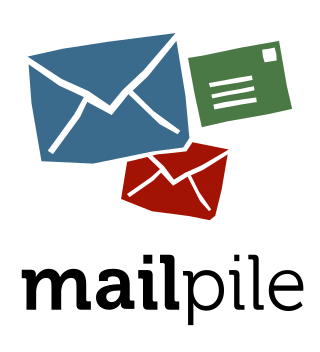Related Research Articles

Microsoft Outlook is a personal information manager software system from Microsoft, available as a part of the Microsoft 365 software suites. Primarily popular as an email client for businesses, Outlook also includes functions such as calendaring, task managing, contact managing, note-taking, journal logging, web browsing, and RSS news aggregation.

Apache SpamAssassin is a computer program used for e-mail spam filtering. It uses a variety of spam-detection techniques, including DNS and fuzzy checksum techniques, Bayesian filtering, external programs, blacklists and online databases. It is released under the Apache License 2.0 and is a part of the Apache Foundation since 2004.
Various anti-spam techniques are used to prevent email spam.

Email spam, also referred to as junk email, spam mail, or simply spam, is unsolicited messages sent in bulk by email (spamming). The name comes from a Monty Python sketch in which the name of the canned pork product Spam is ubiquitous, unavoidable, and repetitive. Email spam has steadily grown since the early 1990s, and by 2014 was estimated to account for around 90% of total email traffic.
Naive Bayes classifiers are a popular statistical technique of e-mail filtering. They typically use bag-of-words features to identify email spam, an approach commonly used in text classification.

Pegasus Mail is a proprietary email client for Microsoft Windows. It was originally released in 1990 on NetWare networks with MS-DOS and later Apple Macintosh clients, before being ported to Windows which is now the only platform actively supported. Since its inception it has been developed by David Harris and is donationware after having previously been freeware.

Yahoo! Mail is an email service offered by the American company Yahoo, Inc. The service is free for personal use, with an optional monthly fee for additional features. Business email was previously available with the Yahoo! Small Business brand, before it transitioned to Verizon Small Business Essentials in early 2022. Launched on October 8, 1997, as of January 2020, Yahoo! Mail has 225 million users.
Opera Mail is the email and news client developed by Opera Software. It was an integrated component within the Opera web browser from version 2 through 12. With the release of Opera 15 in 2013, Opera Mail became a separate product and is no longer bundled with Opera. Opera Mail version 1.0 is available for OS X and Windows. It features rich text support and inline spell checking, spam filtering, a contact manager, and supports POP3 and IMAP, newsgroups, and Atom and RSS feeds.
Email filtering is the processing of email to organize it according to specified criteria. The term can apply to the intervention of human intelligence, but most often refers to the automatic processing of messages at an SMTP server, possibly applying anti-spam techniques. Filtering can be applied to incoming emails as well as to outgoing ones.
Norton Internet Security, developed by Symantec Corporation, is a discontinued computer program that provides malware protection and removal during a subscription period. It uses signatures and heuristics to identify viruses. Other features include a personal firewall, email spam filtering, and phishing protection. With the release of the 2015 line in summer 2014, Symantec officially retired Norton Internet Security after 14 years as the chief Norton product. It was superseded by Norton Security, a rechristened adaptation of the original Norton 360 security suite. The suite was once again rebranded to Norton 360 in 2019.
Disposable email addressing, also known as DEA, dark mail or masked email, refers to an approach that involves using a unique email address for each contact or entity, or using it for a limited number of times or uses. The benefit to the owner is that if anyone compromises the address or utilizes it in connection with email abuse, the address owner can easily cancel it without affecting any of their other contacts.

Kaspersky Internet Security is a internet security suite developed by Kaspersky Lab compatible with Microsoft Windows and Mac OS X. Kaspersky Internet Security offers protection from malware, as well as email spam, phishing and hacking attempts, and data leaks. Kaspersky Lab Diagnostics results are distributed to relevant developers through the MIT License.

Outlook.com, formerly Hotmail, is a free personal email service offered by Microsoft. This includes a webmail interface featuring mail, calendaring, contacts, and tasks services. Outlook can also be accessed via email clients using the IMAP or POP protocols.
TrashMail is a free disposable e-mail address service created in 2002 by Stephan Ferraro, a computer science student at Epitech Paris which belongs now to Ferraro Ltd. The service provides temporary email addresses that can be abandoned if they start receiving email spam. It mainly forwards emails to a real hidden email address.
Pocomail was an e-mail client for Microsoft Windows systems that was first developed by Poco Systems in 1999. It was originally designed to provide better spam and attack protection by using its own scripting methods (PocoScript) as opposed to using JavaScript and native Microsoft scripting.
Email spammers have developed a variety of ways to deliver email spam throughout the years, such as mass-creating accounts on services such as Hotmail or using another person's network to send email spam. Many techniques to block, filter, or otherwise remove email spam from inboxes have been developed by internet users, system administrators and internet service providers. Due to this, email spammers have developed their own techniques to send email spam, which are listed below.

Gary Robinson is an American software engineer and mathematician and inventor notable for his mathematical algorithms to fight spam. In addition, he patented a method to use web browser cookies to track consumers across different web sites, allowing marketers to better match advertisements with consumers. The patent was bought by DoubleClick, and then DoubleClick was bought by Google. He is credited as being one of the first to use automated collaborative filtering technologies to turn word-of-mouth recommendations into useful data.
SmartScreen is a cloud-based anti-phishing and anti-malware component included in several Microsoft products:

Mailpile is a free and open-source email client with the main focus of privacy and usability. It is a webmail client, albeit one run from the user's computer, as a downloaded program launched as a local website.
Mail was an email client developed by Microsoft and included in Windows Vista and later versions of Windows. It is available as the successor to Outlook Express, which was either included with, or released for Internet Explorer 3.0 and later versions of Internet Explorer. It is set to be replaced by Outlook for Windows.